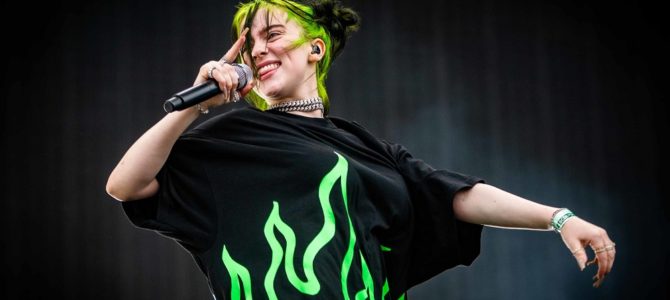
Billie Eilish is not a typical pop star who feeds on fame and idolizing her influence. She makes music with integrity, speaking from the heart, and telling stories that listeners relate to more than the glossy, auto-tune trash that graces so much of hit radio.
Like her music, her fashion choices are unpretentious. In aspiring to be like Eilish, girls don’t have to bare their bodies, but can use their fashion choices for fun, a little bit of hilarity, and refrain from showing off their curves to get noticed.
In her look, Eilish has more in common with the Riot Grrl set than manufactured candy pop darlings. Groups like Babes in Toyland, Bratmobile, and Lunachicks took sexy and turned it into something alienating, often ugly, pointed, and spectacularly vile. Eilish brings back this Gen X look and presents it anew to her Gen Z fans, now covered with labels and logos instead of safety pins.
The Inversion of the Sex Symbol
Camille Paglia talks about the cultural loss of the sex symbol, and Eilish embraces none of the common characteristics of the sexually available young woman. Her lips are not puckered into a pout, and her hair does not lustrously cascade so much as it rebels against the very concept of pretty. And her clothes, these baggy, colorfully vivid, designer fashion choices are more like rave outfits from the 1990s than the revealing looks of Taylor Swift, Lizzo, and Britney Spears.
“What confluence of social trends has led to the sex symbol’s current eclipse?” Paglia laments in The Hollywood Reporter. “At the heart of ancient myths about beautiful, mysterious women was a quest pattern: The hero endured a series of perilous challenges to win the lady or merely to survive an encounter with a magically deceptive temptress. At the deepest level, the woman represented special or occult knowledge, a secret treasure that could only be won by extraordinary men.”
Eilish isn’t playing into that hero’s journey, for now she’s here on her own terms. What Paglia misses is actually something of an advancement.
Eilish doesn’t care if she dresses her age or shows off her body, preferring to be one mass of solid color, puffed not preened, with nails like claws. She could as easily crawl into bed in some of these concoctions as walk the red carpet. After decades of pop fashionistas vying for the attention of the male gaze, turning the vulnerability of sexuality into a seductive super power, it’s refreshing to see a kid dress like a kid.
The Agony of Youth
Her sound brings the pain and agony of youth, the uncertainty of growing up, finding out who you are and just dealing with it. The music is frenetic, with driving beats, while Eilish’s vocals carry the vulnerability that makes her so accessible.
She’s not wrong when she says “kids know more than adults.” That’s true in some very real ways. Kids’ hearts are unguarded, exposed to all radioactive emotional arrays. This is when empathy and love are the equivalent of pain, and when friendships are forged for lifetimes.
Friendship has been hard for Eilish to maintain with her insane touring schedule. Speaking to Elle, she said, “For a while, I would be gone for months and wouldn’t see my friends. I’d come back, and they wouldn’t be friends with me anymore. That’s not their fault. You’re not gonna forget me, but you’re gonna forget what it felt like to love me. It sucked.”
She doesn’t want fake online friends, but real ones. She wants to be loved and to love outside of the virtual world. Real friends don’t care what you wear, so long as you’re happy.
Human connection, making friends offline and keeping them there, speaking true feelings and the reality of an emotional existence, are a push against our two-dimensional lives. With phone as extension of hand, we stare into its reflective face, and beg it to make us feel good, to tell us we are loved. It’s for this that so many primp and preen, posting thirst traps designed not to quench a follower’s thirst, but their incessant need for acknowledgement.
Avoiding the Obsession with Gender
Paglia notes that “Sex has lost its mystique.” But gender sure hasn’t. It’s all the rage. Choosing a gender identity is de rigeur for the younger set, identifying yourself and then exhibiting it in clothes and performative behaviors.
Eilish pushes it all away with an oversized shirt and extra big pants, creating a new mystery, not of winning the maiden, or getting into the temptress’ pants, but one where a person must be known before body is revealed. Heart hangs out further than décolletage. Heels are useless for a woman who pogos on stage. Eilish doesn’t beckon with a come hither stare, or invite you to imagine her curves under your palms.
Of course, there’s more to it than that. Eilish has spoken about her struggles with depression and body dysmorphia. “I’ve never felt comfortable in really tiny clothes,” she said to Vogue. “I was always worried about my appearance. That was the peak of my body dysmorphia. I couldn’t look in the mirror at all.”
Even after coming through that, she’s no image-obsessed VSCO girl. She’s more concerned with her mental health than making sure she’s perceived in some specific way.
To a certain extent, like Eilish Gen Z is in hiding. With all the exposure of social media, the constant barrage of attention seeking, the shallow allure of fame, kids know it’s all fake. They’ve seen it before, and their parents perform live online every day only to collapse morosely when the mentions quiet down, into a reality of brokeness, wokeness, and shattered illusions.
Families still crumble no matter how toned mom and dad look in crop-topped vacation selfies. Being alone in a crowd is nothing compared to the lonely feeling of having 5,000 friends and no one to talk to.
Nirvana’s Dave Grohl has compared the Eilish phenomenon to the skyrocketing success of his own legendary rock band. What the ‘90s kids did was not play for sex appeal, but to pervert it, subvert it, make it as dirty and unappealing as possible. It was a sublime attraction, like reaching for a flowering cactus whose blooms are covered with spikes.
Eilish is onto something with her oversized Burberry and chainmail. Fan focus doesn’t land on fashion sense but on sound and feeling. Emulating Eilish isn’t going to get any young girls in trouble over school dress codes, and for a generation as overexposed and misunderstood as the latest one banging on the doors of adulthood, some legit mystery and modesty is a good thing. Maybe they can get to know themselves before they are judged and shelved by their forebears.









